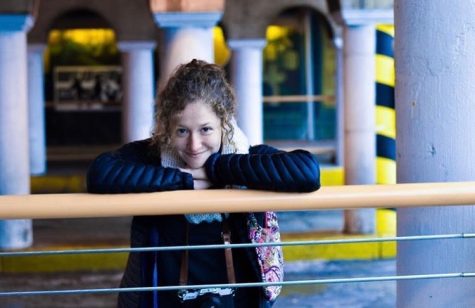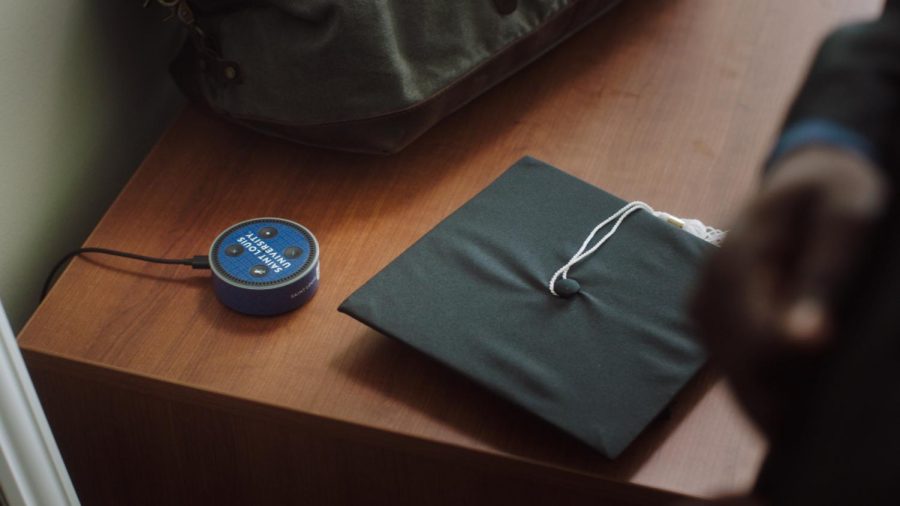SLU is first university to implement Amazon Echo in all on-campus living
Originally an online book seller, Amazon fulfilled its first sale in 1995 when it shipped the book “Fluid Concepts & Creative Analogies: Computer Models of the Fundamental Mechanisms of Thought” to an inquisitive customer, as reported by ABC News. Nearly two years later, Amazon introduced one-click shopping, which expedited customers’ online shopping experience and led to Amazon building its sales-giant image.
In June of 2015, Amazon, yet again, raised the technology bar by releasing its Alexa-controlled Echo speaker in the U.S. Saint Louis University announced on August 9 during the Amazon Web Services global education conference that these Amazon Alexa-enabled devices, managed by Alexa for Business, will be implemented into every on-campus living space by the beginning of the fall 2018 semester.
Programed to not only answer the generic questions, Alexa is also able to respond to over 100 SLU-specific questions, said David Hakanson, SLU’s vice president and chief information officer. Each Alexa will be managed by the University account, so it does not identify which student lives in any specific room and will not be able to connect to a student’s private Amazon or music account.
“Time is very important,” Hakanson said. “While students can still search up information online, it is a time-consuming process. If you’re trying to find out which events are going on today, you have to look through various calendars, which could take five to 10 minutes, or if you have to look up what time the library closes, that takes two to four minutes. We think that there is a lot of value in getting an immediate answer to a question.”
The main driver in implementing the Alexa-controlled Echo speaker was improving time management; by reducing the time it takes students to look up answers to questions, they can focus on other activities, such as studying and student life activities, Hakanson said.
While SLU is the first university to implement the devices in all dorms and on-campus apartments, it is not the first to introduce the technology into a college setting. Arizona State University, University of Oklahoma and Northeastern University introduced the Amazon Echo on a smaller scale, installing the devices in some, but not all, residence halls.
“We were able to learn from [these schools’] experiences, Hakanson said.
After hearing about the Amazon Echo’s success at other universities, SLU launched a pilot study from April to May 2018. Twenty rooms were used to test the Amazon Echo devices, while 20 tested a competitor device. After gathering feedback through a survey, Hakanson said that students preferred the Amazon Echo over its competitor.
With the news of Amazon Echos coming to campus, some students have questioned how SLU can fund the new technology. Each year, Information Technology sets money aside to improve technology across campus, funds which are unrelated to fees or tuition, Hakanson said. Hakanson and IT decided to designate a portion of the funds to providing Amazon Echos to students.
“We hope the [devices] are well-received by the students, and we are going to provide opportunities for the students to give feedback,” Hakanson said. “This way they can tell us what questions are working well and, perhaps, which questions that we don’t have answers to that they would like to ask, so that other students can get the benefit as well.”
Hakanson sees the initial implementation of Amazon Echos in 2018 as the beginning of SLU’s experimentation with voice technology. In the future, he hopes to expand upon the technology and provide more voice services to faculty, staff and students.
Your donation will support the student journalists of Saint Louis University.

Staunch entered SLU as a Biomedical Engineering major on a Pre-med track, with the intention of continuing her studies in medical school. After a year and a half at SLU, she realized she missed the balance of the arts with sciences as she was previously an editor in her high school yearbook committee.
"Working for UNews, whether it was as Associate News Editor, Managing Editor, or Editor-in-Chief, has taught me the value of working on tight deadlines and how to adequately adapt to certain unexpected situations. The field of Journalism is incredibly fast paced - but that is why I love it so much," Staunch said. "There is always something new occurring, and you would not be able to effectively complete your job unless you had the support of your other editors and staff."
Though paradoxical in nature, she switched her major to Communication. She wants to incorporate both her analytical and creative sides to report on medical topics. Her dream job: to write for Discover Magazine.
When Staunch is not in the newsroom, she is captaining the women’s Ultimate Frisbee team at SLU. She began playing her freshman year and enjoys it as an outlet.




